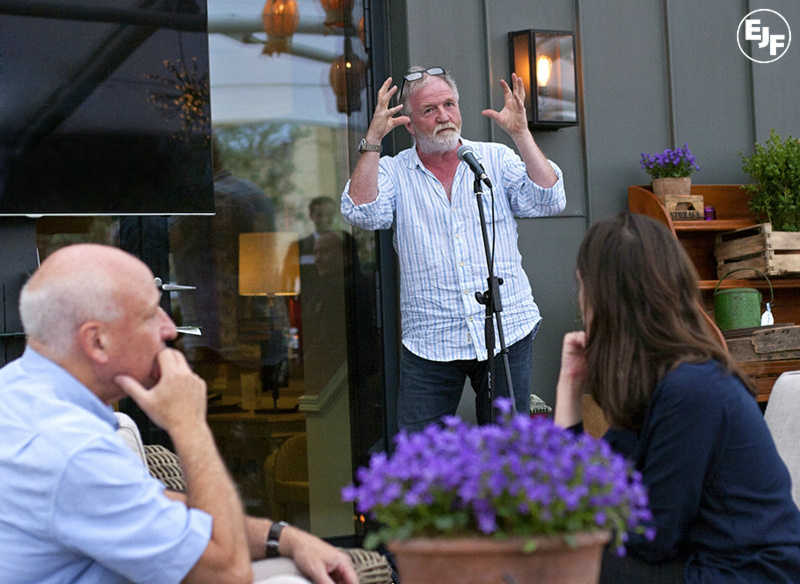
EJF event: Celebrating UK’s bees and pollinators
The Environmental Justice Foundation (EJF) hosted an event on the Roof Terrace of the Firmdale Hotel Ham Yard in London raising awareness of the impacts of harmful pesticides and advocating bee-friendly farming and gardening.
The Save The Bees event was held to celebrate Britain’s bees and other pollinators. The event brought together EJF Patrons, wildlife filmmakers, presenters, chefs, authors, fashion designers and beekeepers to help protect the UK’s bees and other pollinators, and raise funds for the EJF Bee Happy campaign film that will investigate the causes of bee decline and what we can do to reverse it.
Our guest for the evening was George McGavin, zoologist, entomologist and broadcaster. He gave an inspirational speech explaining why bees and pollinators are essential for our planet and how important it is to protect them.
What is the issue?
Bees support not only the variety of the food we eat, but the quality and nutritional value. Their contribution to the global economy for providing free pollinator services is estimated at £130 billion; and here in the UK, around £510 million that is ‘donated’ to the national economy. But bees are vanishing from Britain’s gardens, parks and countryside; 20 species are already extinct and the number of managed honeybee hives have decreased by 54% in recent decades, 70% of bee species in the UK declined between 1980 and 2010. In the past 60 years we’ve ripped out 97% of the wildflower meadows, we’ve caused the climate change impacting their range, and we’ve applied toxic pesticides across the farming landscape, in our gardens and public spaces.
Neonicotinoid pesticides in particular affect bees’ reproduction, resistance to disease, ability to forage and navigate; they can kill our beloved bees. On the basis of the best scientific evidence and following national bans in France, Germany, Italy and Slovenia, in 2013, the EU banned neonics from some farming uses. But the battle for the bees doesn’t end there; industry lobbies haven’t given up their fight; and the chemicals are still on garden centre shelves and available for other crops.
EJF believes that the conservation of British pollinators goes hand in hand with a reduction in the use of toxic pesticides, the protection of diverse wild habitats and increased awareness of the links between pollinators and food production. EJF campaigns against the use of neonicotinoids and promotes organic production that is sustainable and viable to safeguard the health of humans, animals and our global environment.
What can you do to help?
Click to sign your pledge of Bee Happy actions.
- Make your garden a pollinator’s paradise with wild flower seeds and nectar-rich plants, including trees, fruit and vegetables that provide food for bees through the seasons.
- Let the grass grow under your feet this summer – give bees extra food in the clover and buttercups that grow in lawns and a place to shelter.
- Don’t spray – never use bee-harming neonicotinoid pesticides on your plants, and let your favourite garden centre know why they shouldn’t stock neonics or sell plants that have been treated with neonicotinoid pesticides.
- Check the chain – ask your food retailer or producer to check if they have a policy on neonicotinoids in their supply chains – especially for oilseed rape – if they don’t have a policy, ask them to develop one.
- Support organic producers – the companies that have shown their commitment to protecting Britain’s bees and wider environment.
- Pollinators in the Polls – ask your MP to support national restrictions on neonicotinoid pesticides, and a time-bound plan to increase bee-friendly habitats and promote organic agriculture.
Download our Bee Happy leaflet
SIGN UP FOR OUR EMAILS AND STAY UP TO DATE WITH EJF